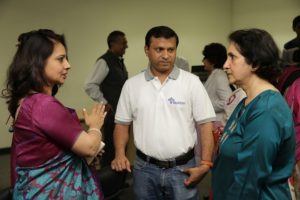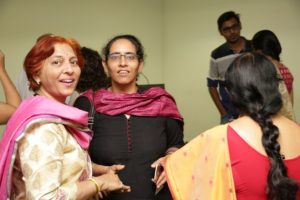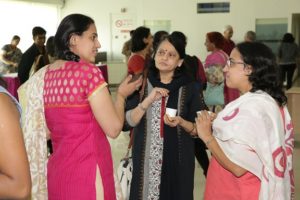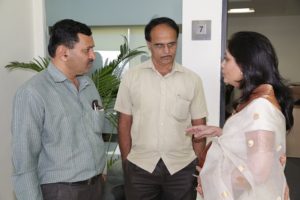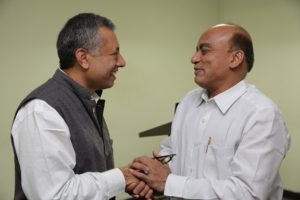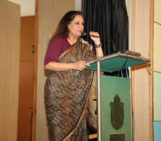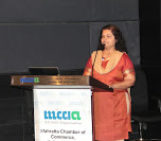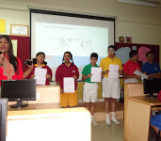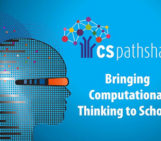CSpathshala had organized a workshop on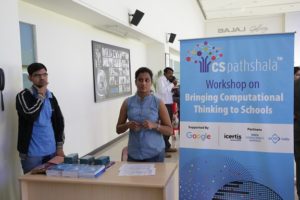 “Bringing Computational Thinking to Schools” for Principals, Trustees and Directors of schools in Pune on 3rd December 2016 at MCCIA Trade Tower, Pune. The main objective of this workshop was to deliberate on the need to teach computing as a science. We received an overwhelming response with participation of 35 Directors and Principals from various schools across Pune, representatives from NGOs, and CSPathshala volunteers.
“Bringing Computational Thinking to Schools” for Principals, Trustees and Directors of schools in Pune on 3rd December 2016 at MCCIA Trade Tower, Pune. The main objective of this workshop was to deliberate on the need to teach computing as a science. We received an overwhelming response with participation of 35 Directors and Principals from various schools across Pune, representatives from NGOs, and CSPathshala volunteers.
In the current academic year 2016-2017, CSpathshala is implementing the pilot project for 15 schools in Pune. The CSpathshala team has developed the Computer Science curriculum and teaching aids in the form of power point presentations, detailed lesson plans and student worksheets and is provided to the schools free of cost.
Welcome and Introduction to ACM India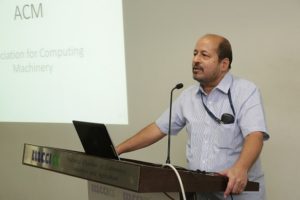
Aarti Halbe welcomed the participants and this was followed by a brief introduction of ACM by Chandrashekhar. The Association for Computing Machinery (ACM) India has started an education initiative, CSpathshala, to promote the teaching of computing as a science in schools.
Keynote address
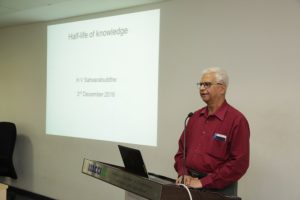 The Keynote speaker was Professor Hari Sahasrabuddhe who has obtained his Masters and PhD in Computer Science and Engineering from IIT Kanpur. Prof. Sahasrabuddhe is a founding faculty member of the Department of Computer Science and Engineering at IIT Kanpur as well as a pioneer in computing education in India.
The Keynote speaker was Professor Hari Sahasrabuddhe who has obtained his Masters and PhD in Computer Science and Engineering from IIT Kanpur. Prof. Sahasrabuddhe is a founding faculty member of the Department of Computer Science and Engineering at IIT Kanpur as well as a pioneer in computing education in India.
He delivered a very thought provoking keynote on “Half life of Knowledge”. He took the audience through the journey of the evolution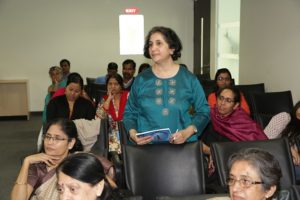 of computers, programming skills and levels of challenges he had faced over the last few decades. Some of the key takeaways from his talk were that as the fast pace at which progress is moving technology lasts for lesser time. The relevance of appropriate knowledge especially in the field of Computer Science is what would equip the students of today and he endorsed that the CSPathshala was one appropriate path to do so. Prof. Sahasrabuddhe urged the educators to impart knowledge to students that would help them not only in the immediate future but will stand them good for the next 40-50 years.
of computers, programming skills and levels of challenges he had faced over the last few decades. Some of the key takeaways from his talk were that as the fast pace at which progress is moving technology lasts for lesser time. The relevance of appropriate knowledge especially in the field of Computer Science is what would equip the students of today and he endorsed that the CSPathshala was one appropriate path to do so. Prof. Sahasrabuddhe urged the educators to impart knowledge to students that would help them not only in the immediate future but will stand them good for the next 40-50 years.
CSpathshala: Overview, Status & Plan for 2017-18
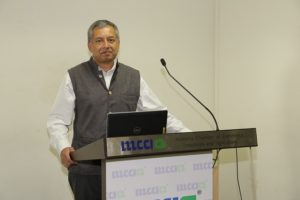 Vipul Shah shared that CSpathshala’s overall strategy is to first create awareness on why computer science should
Vipul Shah shared that CSpathshala’s overall strategy is to first create awareness on why computer science should
be taught in schools and how computer science is different from the current ICT curriculum. CSpathshala is also helping shape a CS curriculum and developing teaching aids. The most important element of the strategy to empower teachers through teacher communities and upskilling teachers through teach training programs.
Starting with 15 schools in Pune in the 1st year, the plan is to enlist 60 schools in the 2ndyear and 216 schools from select cities in the 3rd year into a pilot program.
To assist the process of encouraging creating a “strong teacher community” by providing them with and appropriate plan, CSpathshala has launched the website “learn.cspathshala.org“. This website hosts Curriculum and teaching aids and provides the teachers a platform to share experiences, examples and upload modified content with other teachers on the platform.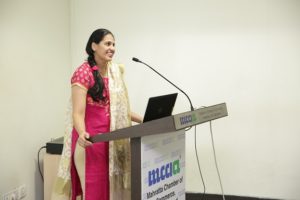
Arati Halbe provided an overview of the pilot implementation. She spoke about the pilot implementation in 15 English medium schools. During the implementation, CSPathshala mentors helped the teachers and teachers gave feedback. Teachers also suggested changes and additions to the slide deck and worksheets. She also mentioned that the special feedback session arranged between teachers and content creators resulted in a very fruitful discussion.
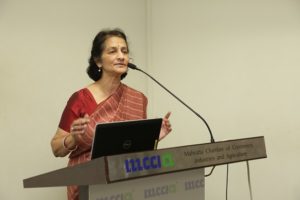 Mrs Bhave, the founder of Gurukul, spoke about maintaining a balance of 3H – Head, Heart and Hand. Students need to develop thinking skills, social skills and work with hand. It has been her dream to teach computer science to her student and she had been having discussions with various experts from the field of Computer Science. She strongly endorses that this need not be done only using computers. Gurukul promotes a curriculum that does not include use of computers till grade 5 and would like to encourage classroom activities on computational thinking. She shared that the CSPathshala curriculum approach of problem solving is not only relevant during Computer Science period but should be adopted during other subjects. She also shared that it would be a good idea to have the Maths and Science teachers also attend the CSPathshala Teachers Training programmes to assist this process.
Mrs Bhave, the founder of Gurukul, spoke about maintaining a balance of 3H – Head, Heart and Hand. Students need to develop thinking skills, social skills and work with hand. It has been her dream to teach computer science to her student and she had been having discussions with various experts from the field of Computer Science. She strongly endorses that this need not be done only using computers. Gurukul promotes a curriculum that does not include use of computers till grade 5 and would like to encourage classroom activities on computational thinking. She shared that the CSPathshala curriculum approach of problem solving is not only relevant during Computer Science period but should be adopted during other subjects. She also shared that it would be a good idea to have the Maths and Science teachers also attend the CSPathshala Teachers Training programmes to assist this process.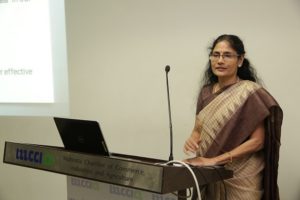
Mrs Mugdha Joshi, Primary computing teacher at KHS School shared her experience using CSpathshala curriculum. Her students are now able to find all the words from puzzle grids using systematic approach. They prepare steps from other subjects and verify if what they have written is an algorithm. She mentioned that Programming workshop by Prof Damodar Kulkarni has changed her outlook towards programming.
Discussions & Closing
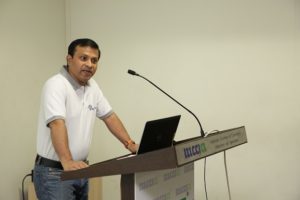 After thanking all the participants for their overwhelming participation, Ravi Mahamuni talked about transforming the CSPathshala initiative into a movement with everybody’s participation. He also said that this initiative is – of the teacher, by the teacher and for the teacher, thus benefiting the children who are the future of our country.
After thanking all the participants for their overwhelming participation, Ravi Mahamuni talked about transforming the CSPathshala initiative into a movement with everybody’s participation. He also said that this initiative is – of the teacher, by the teacher and for the teacher, thus benefiting the children who are the future of our country.
In this endeavour CSPathshala will act as catalyst, enabler and mentor. Teachers need to take this forward for its real success. Requested all participants for their suggestions for how to:
- Proliferate this initiative
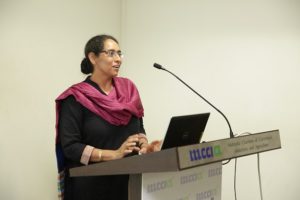
- Encourage teachers to participate into this initiative
- Support in setting up the teachers community
- Translate content and supporting the vernacular language
- Encourage teachers to use new platform for feedback and continuous content evolution
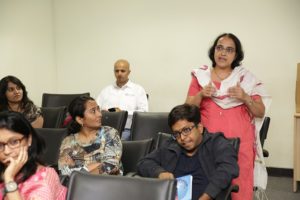 Sonia Garcha said that this Pilot implementation would not have successful without the constant support received from the schools which needs to be applauded. Also the efforts of our volunteers who have created appropriate curriculum for the schools with a special focus to equip our children to become creators and inventors of technology and also socially responsible citizens need a special mention and a big round of applause. She also said that the way CSPathshala perceives in increasing the outreach of this initiative is through the partnership model, and made a special request you to connect us to other schools through your local networks. The Principals and the Directors were very supportive and have committed to organise talks and interactions at their local networks.
Sonia Garcha said that this Pilot implementation would not have successful without the constant support received from the schools which needs to be applauded. Also the efforts of our volunteers who have created appropriate curriculum for the schools with a special focus to equip our children to become creators and inventors of technology and also socially responsible citizens need a special mention and a big round of applause. She also said that the way CSPathshala perceives in increasing the outreach of this initiative is through the partnership model, and made a special request you to connect us to other schools through your local networks. The Principals and the Directors were very supportive and have committed to organise talks and interactions at their local networks.
Many thanks to Suchita, Supriya, Chetan and Other volunteers who made this event possible.
